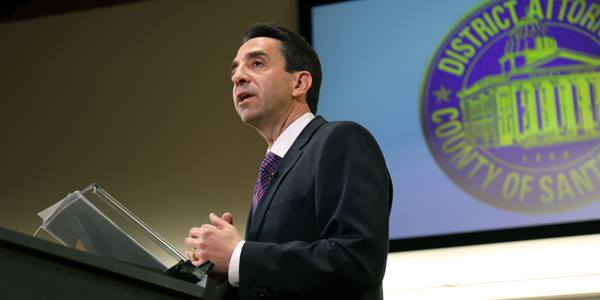The Constitutional rights of criminal defendants in California are not outweighed by state laws protecting the confidentiality of police personnel records, the state Supreme Court ruled last week.
In a way, the court’s opinion vindicates Santa Clara County District Attorney Jeff Rosen’s approach to balancing the rights of law enforcement officers to keep their personnel files private against the rights of the accused to a fair trial. Rosen developed a system for disclosing misconduct records in cooperation with the county’s law enforcement agencies — even before the high court’s ruling.
Simply put, if a prosecuting attorney knows something that indicates the accused is not guilty, that’s exculpatory evidence and the rules of a fair trial dictate defense attorneys be made aware it. Similarly, if a prosecuting attorney knows something that may call the credibility of their case into question — such as testimony or evidence from an officer disciplined for misconduct — that’s impeachment evidence and it must also be disclosed to opposing counsel.
Such disclosures are commonly referred to as “Brady” alerts, named for a U.S. Supreme Court case from 1963.
“Traditionally, especially in California, personnel file information is very private,” said Santa Clara County Assistant District Attorney David Angel. “But when District Attorney Rosen took office he decided to take an affirmative responsibility for discovering impeachment evidence.”
In an August 26 opinion, California’s seven justices agreed that law enforcement agencies in the state have a duty to disclose police misconduct to prosecutors who may rely on evidence or testimony provided by those officers at a criminal trial — even if doing so means providing prosecutors with information from confidential files.
“There can be no serious doubt that confidential personnel records may contain Brady material,” California Chief Justice Tani Cantil-Sakauye wrote in the court’s unanimous opinion. “An officer may provide important testimony in a criminal prosecution. Confidential personnel records may cast doubt on that officer’s veracity. Such records can constitute material impeachment evidence. These are not close questions.”
Angel, who is responsible for the county’s Brady List, says his office routinely notifies defense attorneys in all cases where impeachment evidence is available — but noted that the misconduct is usually not relevant to the prosecution’s case.
“The vast majority of disclosures involve rather minor issues that are unlikely to make much of a difference or even be deemed admissible,” Angel said. “For example, if two years ago an officer plead guilty to a DUI.
“It’s relatively rare for a defense to involve impeaching an officer at all,” Angel continued. “For example, if a defendant is claiming that his ex-girlfriend consented to the sex for which he is being charged with rape, then it hardly matters that the officer who took her statement could be impeached, as the defense is unrelated to the officer’s evidence.”
Nevertheless, Angel says Santa Clara County prosecutors would tell defense attorneys about any misconduct in those hypothetical scenarios. Angel says the District Attorney’s office has been partnering with the 13 law enforcement agencies in the county to provide Brady alerts to prosecutors for years.
“That’s what justice requires and that’s why we do it,” he said.
But that’s not true everywhere in California.
The court’s most recent opinion overturned a lower court’s ruling in a lawsuit filed by the Association for Los Angeles Deputy Sheriffs that state law protected confidential records from Brady disclosures in some cases, and that the sheriff’s office wasn’t obligated to provide prosecutors with a particular document in that case.
“The Association’s contrary view that ‘Brady relates only to the prosecutor’ and that ‘Brady . . . does not impose obligations on law enforcement’ is distressing and wrong,” Cantil-Sakauye wrote for the court. “The prosecution may bear ultimate responsibility for ensuring that necessary disclosures are made to the defense, but that does not mean law enforcement personnel have no role to play.”
The San Jose Police Department has a different working relationship with the Santa Clara District Attorney’s office, said Lieutenant Brian Matchett, commanding officer for the department’s Internal Affairs Unit.
“We have a great relationship with our District Attorney,” Lt. Matchett said. “We have no trouble discussing these things directly with the DA.”
He added that the department investigates every report of police misconduct, whether it comes from inside the department or from the community. A report last month showed the number of internal complaints increased and allegations tied to excessive use of force spiked by 39 percent.
Most cases are handled internally and those that are substantiated involve disciplinary action within the accused officer’s chain of command. Those involving criminal charges are handled first by the courts and then go through a similar internal process for review and discipline.
Either way, Matchett said the San Jose Police Department issues Brady alerts to the District Attorney’s office every time the department makes a finding of misconduct that amounts to “moral turpitude.”
Angel says that term is typically taken to include things like “dishonesty, bias, excessive force and incompetence.”
Contact Adam F. Hutton at [email protected] or follow @adamfhutton on Twitter.



Leave a Reply
You must be logged in to post a comment.